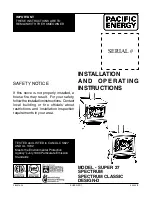
© 2007-2008 Broseley Fires Ltd
13.0
INSTALLATION
OF
THE
APPLIANCE
13.A
FLUE
REQUIREMENTS
The
chimney
is
possibly
the
most
important
part
to
your
installation;
great
care
should
be
given
to
its
design.
An
older
chimney,
in
need
of
repair,
is
a
fire
hazard
in
any
installation.
The
chimney
must
be
thoroughly
swept,
checked
for
soundness
and
suitability,
before
any
connection
is
made
to
the
appliance.
This
must
be
carried
out
by
a
qualified
person.
A
“Declaration
of
Completion”
certificate
must
be
obtained
by
the
end
user
for
the
installation,
failure
to
obtain
this
document
may
void
the
products
warranty.
•
This
appliance
must
be
installed
into
a
‘Class
1
Chimney’.
If
there
is
no
existing
chimney,
then
an
approved
solid
fuel,
factory
built,
prefabricated
block
type
or
a
twin
walled,
stainless
steel
flue
can
be
used.
Get
advice
from
a
qualified
chimney
engineer.
•
The
flue
diameter
of
this
appliance
must
be
a
minimum
of
150mm.
•
In
order
for
the
appliance
to
perform
satisfactorily,
the
chimney
height
must
not
be
less
than
4
meters
measured
vertically
from
the
stove
outlet
to
the
top
of
the
chimney.
•
Adequate
access
for
sweeping
the
flue,
such
as
a
soot
door,
must
be
provided.
This
will
dramatically
improve
the
ease
of
cleaning
and
sweeping
of
the
flue.
•
Flue
pipe
should
be
fitted
inside
the
flue
pipe
collar
(spigot)
to
prevent
creosote
and
condensates
from
running
down
onto
the
top
of
the
appliance.
•
All
flue
pipe
has
to
be
suitable
for
solid
fuel
and
fitted
in
accordance
with
building
regulations,
whilst
complying
with
current
legislation
and
manufacturers’
instructions.
•
If
excessive
draw
is
present,
then
a
suitable
draught
stabilizer
should
be
fitted.
This
must
be
fitted
in
the
same
room
as
the
appliance
is
located.
•
If
the
chimney
suffers
from
down
draught,
then
a
special
‘anti
‐
downdraught’
cowl
will
need
to
be
fitted.
In
exposed
windy
locations,
a
‘stabilizing’
cowl
may
need
to
be
fitted.
The
minimum
cowl
requirement
that
we
recommend,
is
a
rain
cowl
with
a
bird
guard.
•
No
flue
sharing
with
other
appliances
is
allowed.
•
If
a
rear
flue
is
able
to
be
fitted,
the
horizontal
length
must
be
no
longer
than
150mm.
13B
LINING
THE
FLUE
An
insulated
chimney
is
the
most
efficient
and
safe
way
to
burn
wood.
An
insulated
chimney
helps
prevent
the
formation
of
tar
deposits.
A
standard
chimney
will
gradually
get
saturated
in
tar,
this
is
a
fire
hazard.
Tar
stains
may
appear
on
the
surface
of
the
chimney
breast
inside
the
property.
14.0
SITING
THE
APPLIANCE
This
appliance
must
not
be
fitted
into
a
location
where
it
will
be
impossible
to
service.
The
location
must
comply
with
the
requirements
laid
down
in
the
building
regulations.


































